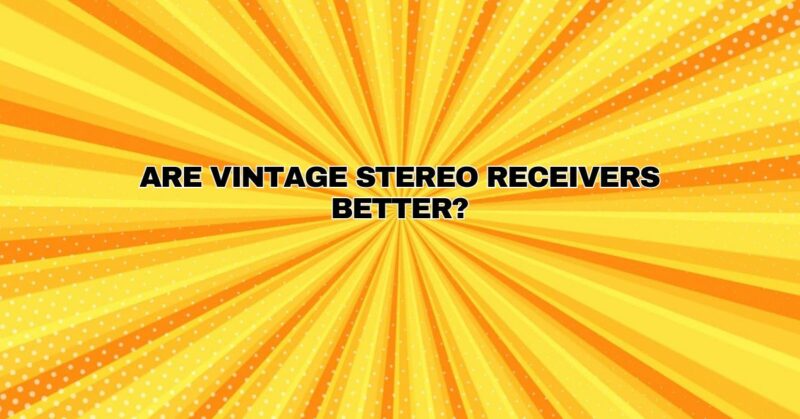In the world of audio enthusiasts, vintage stereo receivers hold a special place. These classic pieces of audio equipment from the past, often originating from the “golden era” of hi-fi, continue to captivate audiophiles and collectors alike. But the question remains: are vintage stereo receivers truly better than their modern counterparts? In this comprehensive article, we’ll delve into the advantages and considerations of using vintage stereo receivers to help you decide whether they are the right choice for your audio needs.
The Appeal of Vintage Stereo Receivers
Before we explore the advantages of vintage stereo receivers, it’s essential to understand why they have enduring appeal:
- Aesthetic Charm: Vintage receivers often feature timeless, minimalist designs with classic analog dials and VU meters that exude a sense of nostalgia and elegance. They can be a statement piece in any audio setup.
- Build Quality: Many vintage receivers were built with meticulous attention to detail and high-quality components. The robust construction and craftsmanship contribute to their longevity.
- Analog Warmth: Vintage receivers utilize analog technology, which can impart a warm and character-rich sound quality that many audiophiles find appealing. The gentle imperfections and harmonics generated by analog components contribute to a more textured and immersive listening experience.
- Customization Potential: Vintage receivers offer enthusiasts opportunities for customization and modification. Audiophiles can experiment with different tubes, capacitors, and other components to fine-tune the sound to their preferences, fostering a deeper connection with their equipment.
Advantages of Vintage Stereo Receivers
Now, let’s explore the advantages of vintage stereo receivers:
- Sound Character: Vintage receivers often have a distinctive sound character that can be highly sought after. They may impart a warm and inviting tone that complements various music genres.
- Build Quality: Vintage receivers are renowned for their durability and build quality. They were constructed to last, using components that stand the test of time. Some collectors even refer to them as “tank-like” due to their sturdy construction.
- Value Retention: Well-maintained vintage stereo receivers can retain or even increase in value over time. Collectors and enthusiasts are often willing to pay a premium for iconic vintage models, making them a potential long-term investment.
- Nostalgia and Heritage: Vintage receivers allow users to connect with the heritage of audio technology. They provide a tangible link to the past and evoke a sense of nostalgia, which can enhance the overall listening experience.
- Customization: Enthusiasts can modify vintage receivers to suit their preferences, allowing for a hands-on approach to audio equipment and potentially achieving unique sonic characteristics.
Considerations and Drawbacks
While vintage stereo receivers offer several advantages, there are also considerations and drawbacks to keep in mind:
- Maintenance: Vintage receivers may require maintenance or restoration, which can be costly and time-consuming. It’s essential to ensure that you are comfortable with potential upkeep.
- Lack of Modern Features: Vintage receivers lack modern features such as digital inputs, wireless connectivity, and advanced room calibration. This may limit their compatibility with modern audio sources and systems.
- Power Efficiency: Older receivers tend to be less power-efficient compared to modern counterparts, which can lead to higher energy consumption and heat generation.
- Limited Warranty: Unlike new products, vintage receivers typically do not come with warranties. Purchasing vintage audio equipment carries inherent risks, and it’s crucial to buy from reputable sellers who provide accurate descriptions of the equipment’s condition.
Conclusion: A Matter of Taste and Preference
Whether vintage stereo receivers are better than modern ones is subjective and depends on your personal taste, priorities, and audio needs. While vintage receivers offer a unique blend of aesthetics, sound character, and craftsmanship, they may lack modern features and require more maintenance.
Ultimately, the decision to use vintage stereo receivers should be guided by your appreciation for the nostalgia, aesthetics, and analog warmth they offer, as well as your willingness to invest time and effort in maintaining and customizing these classic pieces of audio history. For those who cherish the vintage audio experience, these receivers continue to deliver a timeless and immersive journey into the world of high-fidelity sound.

